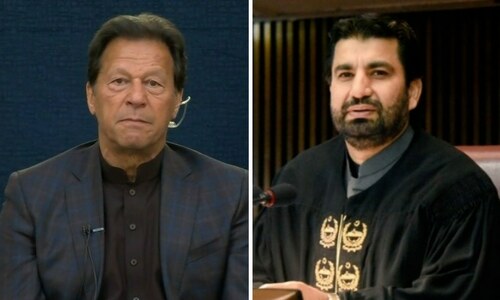IT proved to be a fateful Sunday. The deputy Speaker of the National Assembly, who was presiding over a sitting called specifically to vote on the no-confidence motion against the prime minister, announced his shocking decision to ‘reject’ the motion, without a vote, and prorogued the session. This and the subsequent dissolution of the National Assembly, as well as the calling of snap elections by the prime minister, have triggered a major constitutional and political crisis in the country.
The magnitude of the crisis can be gauged by the fact that the chief justice of Pakistan and two of his colleagues rushed to the Supreme Court and convened the court immediately to address the extraordinary development, even on the judiciary’s day off.
The apex court has been hearing arguments about the constitutionality or otherwise of the Speaker’s pronouncement in day-to-day proceedings. At the centre of the debate is the question of whether the presiding officer had the authority to deviate from or, as some would prefer to put it, violate a constitutional procedure and time frame to remove the prime minister. A closely associated but much larger question is about the actual degree of the water-tight separation of the judiciary and legislative branches of government. To put it simply, does the doctrine of separation of powers prevent the judiciary from questioning the actions of a presiding officer of a legislature, even when an apparent violation of the Constitution has taken place?
It is expected that the Supreme Court’s verdict will provide answers to at least the legal and constitutional aspects of these questions. In the meantime, however, a debate on the authority of the Speaker and the possible limits on his authority is raging not only in the courtroom but also in the media and public spaces.
Read: The Speaker versus the Constitution
Included in the ongoing debate are questions regarding reasonable expectations of neutrality and impartiality from presiding officers of legislatures in general and the Pakistani assemblies in particular. While the Supreme Court may adjudicate on the legal questions, the issue about the neutrality of presiding officers is as much a political one as it is legal.
The judiciary should be given the power, as an exceptional measure, to check constitutional violations.
A presiding officer is primarily a politician, not only in Pakistan but in almost all democracies. Most politicians are affiliated with political parties, and presiding officers are no exception. Presiding officers get elected to the legislature as a candidate of one political party or the other. Even during an election for the position of a presiding officer, political parties put up their candidates, and usually the majority party is able to get its candidate elected. Political parties expect officials, including presiding officers, elected on their tickets to take their side during a political contest in parliament. In fact, political parties pick some of their diehard loyalists for such positions to effectively protect party interests. It is, therefore, unrealistic to expect a presiding officer belonging to one party for years to, all of a sudden, start acting like a politically neutral and impartial entity after his election. Although presiding officers in all legislatures are elected through secret ballot to encourage legislators to vote beyond party affiliations, partisanship among presiding officers in most cases remains dominant.
Another specific issue which has encouraged partisanship among presiding officers in Pakistan, especially in recent times, pertains to production orders for legislators in police custody. Since most detained legislators belong to the opposition, the government is not very keen for these legislators to be allowed to attend parliamentary sessions through the issuance of production orders. In recent times, many presiding officers have been reluctant to use their discretionary powers to issue production orders for opposition legislators. A case in point is veteran parliamentarian and former federal minister and leader of the opposition, Syed Khurshid Shah, who remained in the custody of the National Accountability Bureau for over two years, but was not allowed to attend parliament.
This leads to another important point. Since presiding officers can’t be expected to act as neutral heads of legislatures, the Constitution, laws and the rules have to lay down an unambiguous legal framework for guiding the conduct of presiding officers. This is especially important in societies where a democratic culture and parliamentary traditions have not taken firm root. Although, the principle of separation of powers among the three branches of government is a cherished ideal, the judiciary needs to be given the power, as an exceptional measure, to check any violation of the Constitution. This is distinct from the rules of procedure and conduct of business within the legislatures, which should come under the authority of the presiding officer.
A democratic order is also about checks and balances. While a robust legal framework and vigilant judiciary can guard against any possible transgressions of authority by presiding officers, an organised parliamentary secretariat staffed with professionals and granted reasonable job security, so that they can stand up to unlawful commands by presiding officers, is also important.
In recent times, the superior courts have been reluctant to interfere in matters which primarily belong in parliament. The courts have maintained that parliament and the provincial legislatures should use their legislative powers to resolve political issues within the legislatures. This is a fair position and questions, for example, about the powers of the presiding officers should be decided by the legislatures by amending the Constitution, laws or rules, instead of asking the courts to interpret the constitutional provisions.
In the short term, however, the courts may need to adjudicate on the powers of the presiding officers, as parliament — mainly because of the persistent confrontation between the ruling coalition and the opposition as well as the prime minister’s rigid stand of not talking to the opposition — is not in a position to effectively legislate.
The writer is president of the Pakistan Institute of Legislative Development And Transparency.
Twitter: @ABMPildat
Published in Dawn, April 7th, 2022














































